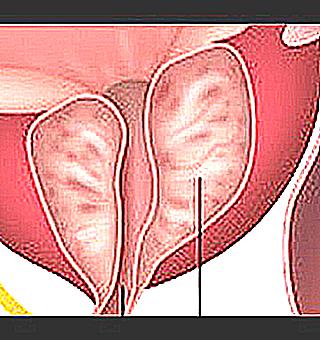Home >
Erectile Dysfunction >
Instructions for the use of Doxycycline for prostatitis in men
Instructions for the use of Doxycycline for prostatitis in men

In case of inflammation of the prostate gland of an infectious etiology, the urologist prescribes antibiotics as the main drug. Doxycycline in prostatitis has proven itself well due to its rapid penetration into the tissues of the glandular organ in men. Active substances eliminate pathogenic bacteria in a short time.
Medication Description
Doxycycline belongs to the semi-synthetic antibiotics from the tetracyclines group. Many microorganisms are sensitive to it. The active ingredient penetrates into the pathogenic cell, penetrating directly into DNA or RNA.
Accordingly, the mechanism of cellular protein production is damaged. Because of this, the causative agent of the infection cannot fully exist and is excreted from the body by the immune system. The drug inhibits the activity of the following agents:
- Causative agent of dysentery;
- Chlamydia;
- A venereal granuloma provocateur;
- Legionellosis bacteria;
- Anthrax stick;
- Plague Wand;
- Malaria initiator;
- Cholera pathogen;
- Gram negative bacteria;
- The microbe that causes glanders;
- The causative agent of brucellosis.
Composition and form of release
Doxycycline derivatives are used as active substances in the manufacture of medicinal products:
- Calcium salt;
- Hydrochloride;
- Monohydrate.
The capsules contain a component at a concentration of 100 mg. The medication is not available for intravenous or intramuscular administration.
Indications and contraindications
Doxycycline therapy is possible only after being prescribed by the attending physician. He prescribes the drug based on the results of laboratory tests and the complete identification of the infectious agent.
It is important to know that antibiotic therapy should not be interrupted. Otherwise, microbes are likely to develop resistance to a certain group of antibiotics and, as a result, the development of complications.
The main indications for the use of Doxycycline:
- Dermatological diseases of an infectious nature;
- Bacterial soft tissue damage;
- Gastrointestinal pathologies caused by certain bacteria and microbes;
- Diseases of the respiratory tract provoked by pathogenic microorganisms;
- Infectious inflammation of the genitourinary system.
The exclusive presence of infection makes the use of Doxycycline capsules justified. Treatment of prostatitis, provoked by blood stagnation or other reasons, does not require the inclusion of antibiotics in the therapeutic regimen: in this case, they are useless and even harmful.
The drug is effective in the presence of the following symptoms accompanying inflammation of the prostate and exacerbation of the chronic form of the disease:
- Increased body temperature;
- Presence of puffiness;
- Severe soreness;
- Difficulty urine flow;
- Impurities of blood and pus in urine
- Erectile dysfunction;
- General weakness and fatigue.
Doxycycline should not be taken when:
- Hypersensitivity to active substances;
- Lactose intolerance if coated capsules are purchased;
- Severe liver failure;
- Porphyrias.
You should also not be treated with Doxycycline before the age of 12.
Under strict medical supervision and with regular health checks, it is permissible for men suffering from:
- Kidney dysfunction;
- Leukopenia;
- Allergy to tetracyclines.
Side effects are most often manifested in case of overdose and are expressed in the following manifestations:
- Pain in the epigastric region;
- Nausea and vomiting;
- Migraines;
- Decreased appetite;
- Loss of coordination;
- Severe hypotension;
- Stool disorder;
- Tinnitus;
- Tachycardia;
- Burning and itching of the skin;
- Rash;
- Yellowing of tooth enamel;
- Violation of intestinal microflora.
When undergoing drug therapy by other means, it is important to inform your doctor about this. Doxycycline cannot be combined with:
- Penicillins;
- Barbiturates;
- Antacids.
This combination reduces the effectiveness of Doxycycline. Taking simultaneously with anticoagulants increases the risk of bleeding.
Treatment of prostatitis with Doxycycline
It is necessary to take Doxycycline for prostatitis within the prescribed period of time. If treatment is stopped early for reasons of pain relief and uncomfortable symptoms, a relapse is likely.
According to the instructions for use, the standard course duration is 7-14 days.The most common dosage regimen:
- Daily dosage - 200 mg;
- It must be taken once or divided into 2 equal portions;
- Intervals between appointments - 24 or 12 hours;
- Capsules should be taken immediately after meals in order to minimize the risk of developing gastritis and other gastric pathologies;
- It is important to drink them with plenty of water;
- After 5 days, the urologist can reduce the daily rate.
With an extremely severe course of the disease, the duration of treatment can be up to 1 month. No dosage reduction is required for older men. The presence of renal or hepatic pathologies requires an individual calculation of the daily allowance.
Efficiency
The high efficiency of Doxycycline lies in the speed with which it penetrates the prostate: after 45 minutes, the agent begins to act. The peak of activity occurs after 2 hours and lasts for 12 hours. According to reviews, the drug can be taken by men who are allergic to other antibiotics of the tetracycline group. In addition, the medicine has a milder effect on the organs of the digestive system.
The cost of Doxycycline (100 mg) depends on the number of capsules in the package and the place of purchase. In general, the medication belongs to the budget



























